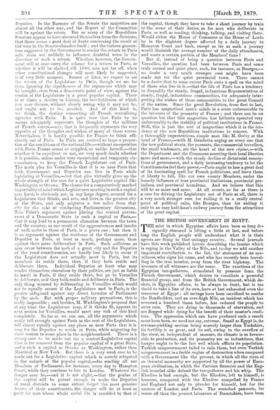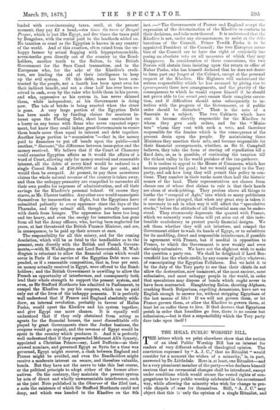THE BRITISH GOVERNMENT IN EGYPT.
THE mist in which Egyptian affairs have been so long de- signedly obscured is lifting a little at last, and before long the English people will understand what it is their agents are doing in that unhappy country. Several journals have this week published letters describing the famine which is raging in the Valley of the Nile, and to-day we add another important contribution to the list, the statement of an eye- witness, who signs his name, and who has recently been travel- ling in the true interior, away from the river highway. The accounts of all witnesses are the same. The exactions of the Egyptian tax-gatherers, stimulated by pressure from the French Government, which desires to conciliate a powerful financial group, and from the British Government, which de- sires, in Egyptian affairs, to be always in front, but is too timid to take a line of its own, have at last exhausted even the resources of Egypt ; all savings have been sacrificed to soothe the Bondholders, and an over-high Nile, an incident which has occurred a hundred times before, has reduced the people to utter ruin. They are dying in thousands of starvation, and are flogged while dying for the benefit of their master's credi- tors. The oppression which can have produced such a result must have been, we need not say, extreme. Small as Egypt is, its revenue-yielding section being scarcely larger than Yorkshire, its fertility is so great, and its soil, owing to the overflow of the river, so independent of manure, its climate is so favour- able to production, and its peasantry are so industrious, that hunger ought to be the last evil which afflicts its population. Turkish misgovernment failed to ruin them, but even Turkish misgovernment is a feeble engine of destruction when compared with a Government like the present, in which all the vices of an Oriental monarchy are supported by all the power of Euro- pean civilisation, in which the Parisian financier and the Eng- lish ironclad alike defend the tax-gatherer and his whip. The Khedive is bad enough, but the Khedive, left to himself, is humane, compared with the Khedive compelled by France and England not only to plunder for himself, but for the usurers of London and Paris. The wretched peasants, far worse off than the poorest labourers of Dorsetshire, have been
loaded with ever-increasing taxes, until, at the present moment, they pay £2 a head,—ten times the taxes of Bengal Proper, which is just like Egypt, and five times the taxes paid by Bengalees, with the rental paid to the landlords added on. No taxation so cruel as the Egyptian is known in any country of the world. And of this exaction, often raised from the un- happy farmer by actual flogging with hippopotamus-hide, seven-tenths goes directly out of the country to the Bond- holders, another tenth to the Sultan, to the British Government for the Suez Canal transaction, and to the Europeans who, for the sake of the Khedive's credi- tors, are lending the aid of their intelligence to keep
up the evil system. Of this debt, none has been con- tracted by the people, not a fourth has been spent even for their indirect benefit, and not a clear half has ever been re- ceived in cash, even by the ruler who holds them in his power, and who, oppressive as his system is, has never skinned them, while independent, as his .Government is doing now. The tale of bricks is being exacted when the straw is gone. A very large portion of the Egyptian Debt has been made up by funding claims for usurious in- terest upon the Floating Debt, short loans contracted in a hurry on any terms with firms who never expected repay- ment, but knew they could induce great Governments to secure them bonds more than equal to interest and debt together. Another large portion is "commission "—that is, the money paid to financiers to put off bonds upon the public—and another," discount," the difference between issue-price and the money received. We believe that if the Court of Chancery could examine Egyptian affairs as it would the affairs of a ward of Court, allowing only for money received and reasonable interest, all the debts of every kind would be reduced to a single Consol Stock of f50,000,000 at four per cent., and would then be overpaid. At present, to pay these monstrous claims the whole natural revenue of the country is taken away, and then the unhappy peasantry are compelled to surrender all their own profits for expenses of administration, and all their savings for the Khedive's personal behoof. Of course they starve, as Mr. Chester testifies. Any other race would emancipate themselves by insurrection or flight, but the Egyptians have submitted patiently to every oppressor since the days of the Pharaohs, and they submit still, though actually menaced with death from hunger. The oppression has been too long and too heavy, and even the energy for insurrection has gone from all but the Army officers, who, having been neglected for years, at last threatened the British Finance Minister, and are, in consequence, to be paid up their arrears at once.
The responsibility for all this Misery, and for the coming desolation, which will be as fatal to the bondholder as to the peasant, rests directly with the British and French Govern- ments,—with M. Waddington and Lord Beaconsfield. M. Wad- dington is reluctant to allow the financial crisis which would occur in Paris if the service of the Egyptian Debt were sus- pended, or if a reasonable composition, that is, four per cent. on money actually received in Egypt, were offered to the Bond- holders ; and the British Government is unwilling to allow the French an opportunity of interference, and consequently both lend their whole strength to support the present system, and even, as Sir Stafford Northeote has admitted in Parliament, to compel the Khedive to pay his coupons, which can be paid only out of the lives of the unhappy peasants. It is perfectly well understood that if France and England absolutely with- drew, an internal revolution, probably in favour of lialim Pasha, would upset the Khedive and his system together, and give Egypt one more chance. It is equally well understood that if they only abstained from acting as agents for the financial houses, the most discreditable role played by great Governments since the Jecker business, the coupons would go unpaid, and the revenue of Egypt would be spent in the eountry which produces it. And it is perfectly well understood that if they superseded Mehemet Ali's dynasty, appointed a Christian Prince—say, Lord Dufferin—as their avowed nominee, and governed Egypt as Syria for a time was governed, Egypt might recover, a clash between England and France might be avoided, and even the Bondholders might receive a moderate interest on secure, and therefore valuable, bonds. But they have not the nerve to take this last course, or the political principle to adopt either of the former alter- natives. On the contrary, they maintain the present system by acts of direct and wholly unwarrantable interference, such as the joint Note published in the Observer of the 23rd inst., a note the existence of which Sir Stafford Northcote could not deny, and which was, handed to the Khedive on the 8th
inst. The Governments of France and England accept the expression of the determination of the Khedive to conform to their decisions, and take note thereof. It is understood that the Khedive is not, under any circumstances, to assist at the deli- berations of the Council. Prince Tewfik Pasha is to he appointed President of the Council ; the two European mem- bers of the Council are to have the right of conjointly im- posing an absolute veto on all measures of which they may disapprove. In consideration of these concessions, the two Powers will abstain from insisting upon the return to office of Nubar Pasha, who has himself declared that he does not desire to form part any longer of the Cabinet, except at the personal request of the Khedive. His Highness will understand the serious responsibility which he has assumed by giving rise to (provoquant) these new arrangements, and the gravity of the consequences to which he would expose himself if he should not prove able to (ne savait pas) ensure their complete execu- tion, and if difficulties should arise subsequently to in- terfere with the progress of the Government, or if public order should be disturbed." That is the note of a Suzerain to a subject. The two Cabinets which have sent it become directly responsible for the Khedive to whom they give such orders, and for the "Minis- ters" whom they vest with such a veto, and therefore responsible for the famine which is the consequence of the present drain upon the people. By maintaining those Ministers they sanction their acts, and become responsible for their financial arrangements, whether, as Sir G. Campbell believes, they take the form of staving off repudiation till a fixed date, or, as is possible, of continuing the taxation till the richest valley in the world perishes of the tax-gatherer.
It is useless to appeal to the House of Commons, which has become paralysed for good ; but we would appeal to the Tory party, and ask how long they will permit this policy to con- tinue. They number in their ranks more than half the historic names of the land. Their representatives are chosen from classes one of whose first claims to rule is that their hands are clean of stock-jobbing. They profess above all things to loathe the "cesspool of Agio," into which so many politicians of our day have plunged, that when any great step is taken it is necessary to ask in what way it will affect the "speculative stocks," before the attitude of all influential men can be under- stood. They strenuously deprecate the quarrel with France, which we earnestly warn them will yet arise out of this inde- fensible confederacy to protect purely financial designs. We ask them whether they will not interfere, and compel the Government either to wash its hands of Egypt, or to substitute for its meddling, direct and responsible interference, if possible in agreement with France, but if needful in opposition to France, to which the Government is now weakly and even slavishly submissive. We have not the slightest wish to make the question a party one. We shall be delighted if Lord Bea- consfield has the whole credit, by any course of policy whatever, of emancipating the Egyptian Fellaheen. But we hold it to be the duty of the Tory party to see that their chiefs do not allow the destruction, now imminent, of the most ancient, most submissive, and most unhappy people in the world, in order that speculators may dispose of bonds which ought never to have been contracted. Slaughtering Zulus, shooting Afghans, crushing South Bulgarians, expelling Armenians, have net we English enough to answer for, without stripping Egyptians of the last means of life ? If we will not govern them, or let France govern them, or allow the Khedive to govern them, at least let us suffer them to live. If God decrees that Egyptians perish in order that Israelites go free, there is no course but submission,—but is that a responsibility which the Tory party dare take upon itself ?



































 Previous page
Previous page